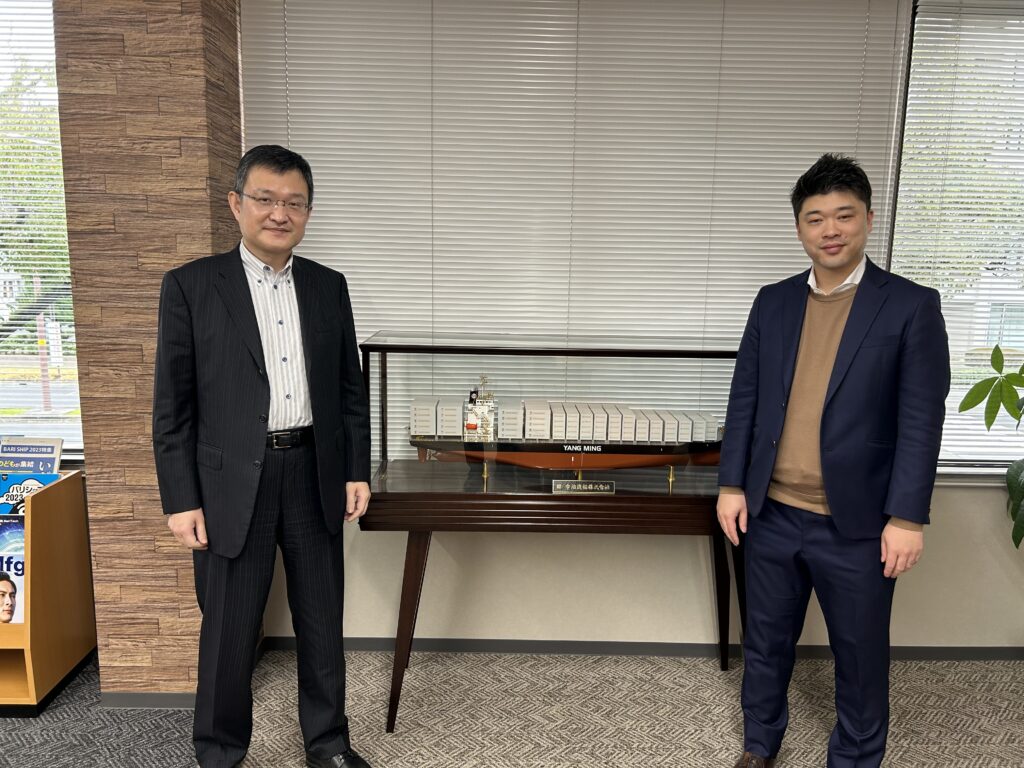
Yamaguchi Financial Group (YMFG), which includes Yamaguchi Bank, Momiji Bank, and Kitakyushu Bank under its umbrella, has a growing balance of loans to ocean-going vessels, mainly Japanese shipowners, totaling 650 billion yen as of September 30, 2023. Shintani explained to me under the current ship finance situation, “Prices for new ships are still high. However, shipowners are bringing us many new building projects for the 2027-28 future. “I asked him about the current situation at YMFG. Keita Tanaka, Section Chief of Ship Financial Group, was also present for the interview. (Interviewer: Hirofumi Yamamoto)
■Support for New Fuel Vessels
–What are the unique points about the current ship financing market?
“I am aware that the next generation of marine fuels, such as LNG, methanol, and ammonia, have not yet been determined globally. New building prices will also be high. On the other hand, new buildings that use these new fuels often have medium to long-term contracts with operators. We would also like to respond actively to new fuel ships.”
–What about new ship types?
“More and more shipowners are taking on new projects such as ammonia and LPG (liquefied petroleum gas) carriers. A global supply network for ammonia is being developed. We would like to carefully evaluate the use of ammonia and LPG carriers as an environmentally friendly financing project.”
–What is the process by which YMFG’s financing projects are evaluated?
“Yamaguchi Bank, Momiji Bank, and Kitakyushu Bank are approached with ship financing proposals, and the banks request the Ship Finance Office to evaluate the proposals. Based on the results of the Ship Finance Office’s evaluation, each bank makes the final loan decision. This system allows for a unified view between the head office and each bank in the evaluation of each project.”
–What are the key points in YMFG’s financing decisions?
“We look at whether the project is beneficial to the shipowner. For example, there are an increasing number of projects that have good charter terms, but the creditworthiness of the operator cannot be fully assessed. If there is limited information on the operator, we will not take on the project. We always ask operators to provide financial statements and other documentation. Recently, more and more operators are submitting their financial statements to us regularly.”
“However, we do not decide whether or not to finance vessels based on this information alone. If the asset value of the vessel is low, even if the charterer is undecided, there are several options, such as pool operations and market-linked contracts. Of course, there are risks involved, but only if the owner is willing to have such vessels in the fleet portfolio. While it is not desirable to have only high-risk vessels, the nature of the fleet composition, including the form of charter contracts, is an important factor in the decision-making process.”
■Red Sea risk mitigation
–Since last December, there have been several attacks on vessels operating in the Red Sea. Do you have any concerns about the ships you finance?
“We believe there are significant concerns. The YMFG Group is constantly monitoring the shipping industry for anti-money laundering measures and the deployment of vessels to illegal areas. The prohibition of deploying vessels to Russia and areas not covered by war insurance is included in the loan agreement, but it is not practical to suspend navigation in the Red Sea, so we have to leave it to the operators to deal with the situation.”
“Especially in the case of BBCs (Bareboat Charters), it is difficult for the Japanese shipowners who own the vessels to demand that the vessels stop operating effectively. Although our loan customers have not yet suffered any losses, we believe it is necessary to identify the risk of being involved in disputes and to share this information with shipowners.”
–Demand for LNG carriers is growing. What are regional banks doing to finance LNG carriers?
“We are willing to lend to LNG carriers wherever possible. We are actively participating in syndicated loans for LNG carriers. Although there are only a limited number of shipowners who can own LNG carriers, we will continue to actively respond to any proposals that come our way.”
–From a ship finance perspective, is there any change in your relationship with Japanese shipowners?
“With the growth of the new shipbuilding line table (construction plan), we are receiving an increasing number of inquiries for S&LB (sale and leaseback) projects, but there are not many projects that match our income and expenses. The company receives about 120-150 projects a year, including new buildings, but has only been able to respond to about 50 so far. Some shipowners are under pressure to secure depreciating assets. We politely explain to them that we do not want them to invest in projects that will not be profitable or where we cannot adequately assess the risk over a long period.”
■Profile
Kohjitsu Shintani graduated from Konan University’s Faculty of Law in 1996 and joined Momiji Bank, where he worked in YMFG’s risk management department before assuming his current position in November 2019. He is 52 years old.